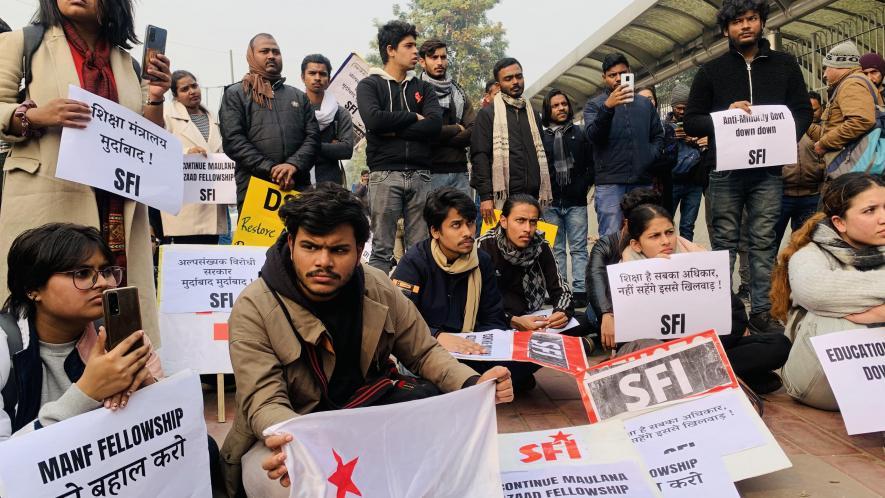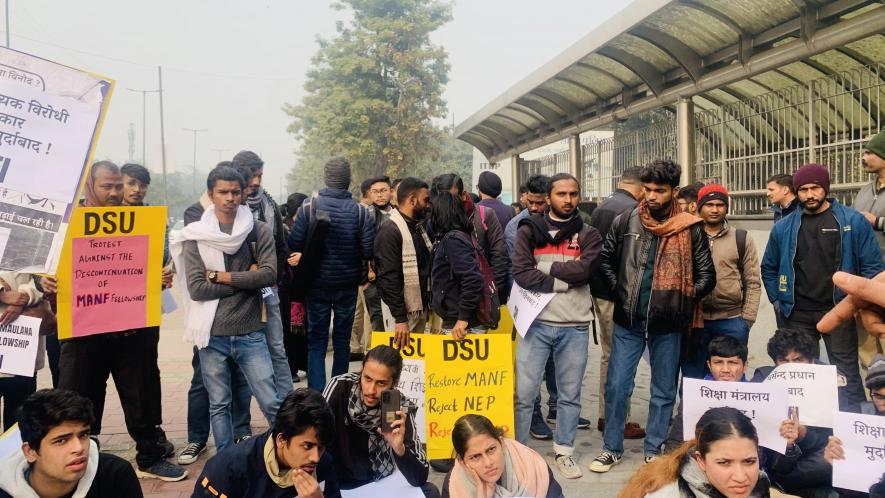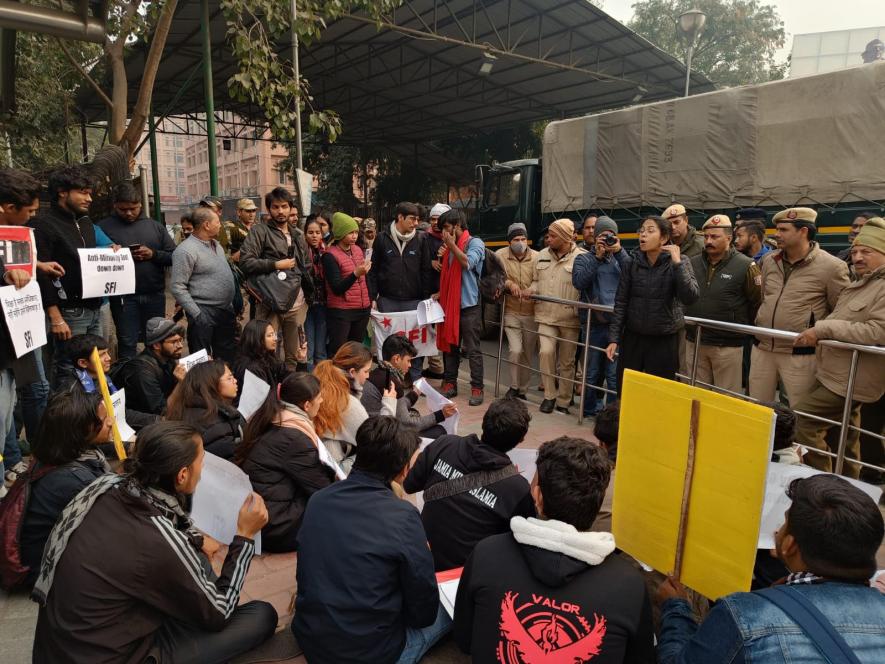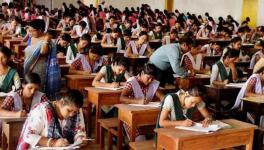MANF: ‘Centre Has Snatched Opportunities from Thousands of Minority Students’

Students organisations protest against the discontinuation of Maulana Azad National Fellowship in Delhi. (File Photo)
New Delhi: Students across university campuses in the country on Monday protested the discontinuation of the Maulana Azad National Fellowship, asserting its scrapping would hurt the prospects of thousands of minority students, especially girl students, of achieving economic independence and leading a dignified life.
The protests, at the call of Students Federation of India (SFI), were held in front of the Education Ministry in the national capital, as well as in Maharshi Dayanand University, Rohtak, Presidency University, Kolkata and Hyderabad Central University among others.
The Maulana Azad National Fellowship or MANF was awarded by Ministry of Minority Affairs on the lines of the Junior Research Fellowship (JRF) provided by University Grants Commission. In its reply to a question in Parliament during the Winter Session, the Centre had said: “The Ministry of Minority Affairs, Government of India has been implementing the Maulana Azad National Fellowship (MANF) Scheme on the lines of the JRF Scheme of UGC and CSIR. The UGC and CSIR Fellowship Schemes are open for candidates of all social categories and communities including minorities. Further, students from minority communities are also covered under National Fellowship Schemes for Scheduled Castes and OBC's implemented by Ministry of Social Justice & Empowerment.

File Photo
In view of the overlap among the aforesaid Schemes - it has been decided to discontinue the MANF Scheme from 2022-23 onward.”
Explaining how the discontinuation of the fellowship would hurt minority students, Aseed Karim Hussain, a research scholar at Delhi School of Economics, who took part in the protest in New Delhi, told NewsClick that it was a shock to him as the struggle to live in Delhi without family support had already been taxing for him.
“The journey from Kerala to Delhi itself was a big task. When I calculated the expenses of living and studying in Delhi, I figured out that you must have Rs 9,000 in your pocket. It was unimaginable for my farming family to send this amount to me from their savings. In the beginning, I started giving tuitions to arrange more funds. Later, I started getting non-NET fellowship of Rs 8,000, from which I have to shell out Rs 5,000 for room rent alone,” he said.
Hussain added: “I was looking up to Maulana Azad Fellowship with great hope. Then the Centre simply scrapped the scheme. Please remember that a significant number of minority girls look up with much hope to MANF. In absence of it, they will have to succumb to family pressures, like marriage. Recently, I have been awarded JRF. Had I not qualified for this time, I would have had to go back home. Other minority students are not this lucky. This government has snatched away opportunities from them.”
Adham Rafeeq, a student from Jamia Millia Islamia, said the students like him were staring at an uncertain future as the fee in Central universities are rising whereas the number of scholarships have consistently reduced.
“Even though I come from a state with 100% (Kerala) literacy, only 2-3% students move out of state to Central universities for further studies. We looked up to the Central universities because fee was low. In my university alone, UGC has reduced grants by one third last year. Other than BA courses, the fee is somewhere between Rs 75,000 to Rs 1 lakh/annum. When I applied for one of the scholarships in graduation, I was informed that they had exhausted because it was meant to be shared among Central universities. So, the struggle is multi-layered. My father works in the Gulf and I am studying in Delhi. There is no one to look after my mother. The Centre has extinguished a ray of hope for us!”
The protesting students, many of them aspiring for higher education, said the decision had crashed their dreams. Aishe Ghosh, president, Jawaharlal Nehru University Students Union, who led the protest in Delhi, told NewsClick that the lacunas in the scheme should have been removed but scrapping it altogether has crashed the dreams of minority students to pursue research.

“Let us be very clear, that Muslims are one part of the minority population. MANF catered to Sikh, Christian, Buddhist and Jain students, too. So, the Centre’s argument that Muslims are also getting other scholarships for their backwardness does not hold ground. UGC is the governing body and Ministry of Minority Affairs implements MANF. Even if fellowships are overlapping, a student can get only scholarship duly verified by his supervisor. Also, a university maintains a portal for such candidates. Even if there were some loopholes, these could have been corrected it. Scrapping the scheme is no solution.”
Elaborating the impact this decision could have on the future of minority students, Ghosh said: “In last five years, 5,700 students availed the benefits of the scheme. I think the number of minority students entering higher education is much higher and many students are compelled to work in the absence of financial support. A student must have funds to do field visits and other research work. Without financial support, there can be no research.”
Citing an example, the JNUSU president said: “The students in M Phil and PhD get two scholarships, non-NET scholarship as well as JRF by UGC. Now, if a student was admitted in the programme for six months and getting non-NET fellowship and s/he qualifies for JRF too, s/he will have to return six months of scholarships to the university to avail JRF. The rules are very clear for it.”
Ghosh alleged that MANF was an “eyesore” for Rashtriya Swayamsewak Sangh (RSS) as it undermined its campaign to show minorities in poor light. “The scrapping of MANF and introduction of foreign universities regulations is part of larger agenda under New Education Policy 2020. Students from minority communities entering higher education were able to critically thinking about any government and it policies. The present day government does not want questions from these communities. They want to portray minorities in a specific way, that the minorities do not study and are engaged in some specific work. This perception of theirs gets disturbed by education and the fact that there can be doctors, professors and army professionals from among the minorities.”
On the protest, Ghosh said: “We are fighting for education as a right available to all.”
Speaking over the phone with NewsClick, Abhishek Nandan, president, Hyderabad Central University Students Union, who led the protest at South Shopcom inside the campus, said that scrapping of the fellowship was contrary to the directives of New Education Policy (NEP).
“The NEP envisages spending 6% of GDP on education but here they are scrapping fellowships that were introduced for enabling upward social mobility among minorities. In Hyderabad, we are witnessing a different situation altogether. The minority students from Bihar, Bengal and Jharkhand come to Osmania University and Maulana Azad National Urdu University in thousands because their medium of instruction is Urdu. These boys and girls had just taken their first step when the government removed the ladder.”
In Kolkata, Souren Mallick, general secretary, Presidency University Students Union, told NewsClick over the phone that scrapping a national scholarship meant the government was insensitive to the needs of minorities. “We will wage a national struggle to reclaim it. The fellowship was critical for minorities given the deplorable situation of minorities, as highlighted by the Justice Sachar committee report.” he said, adding that: “National fellowship only meant that minority students from across the country could access it. So, its scrapping is a national justice. We are mobilising students at the local level and if need be, we will wage a national struggle, too.”
Get the latest reports & analysis with people's perspective on Protests, movements & deep analytical videos, discussions of the current affairs in your Telegram app. Subscribe to NewsClick's Telegram channel & get Real-Time updates on stories, as they get published on our website.























